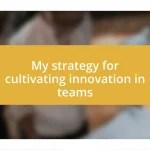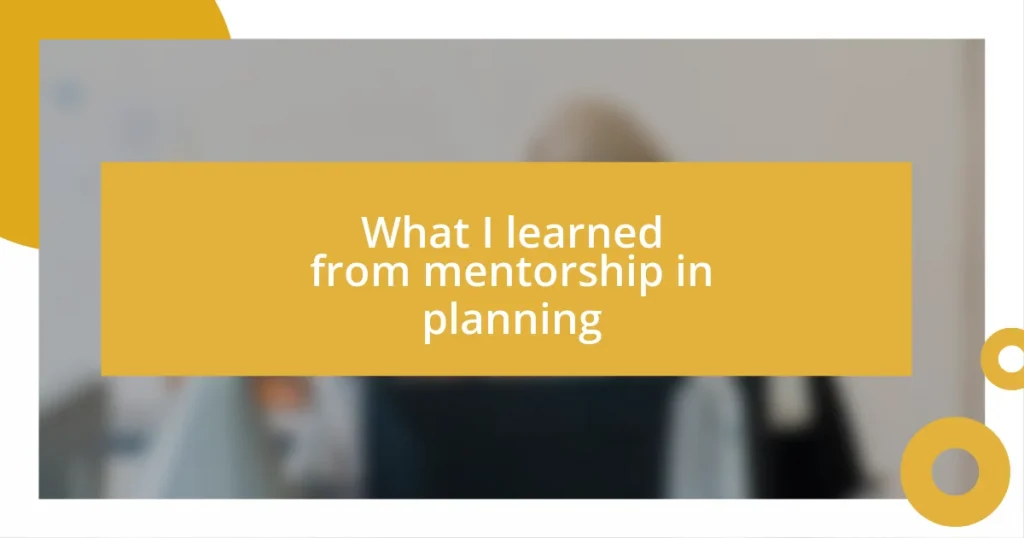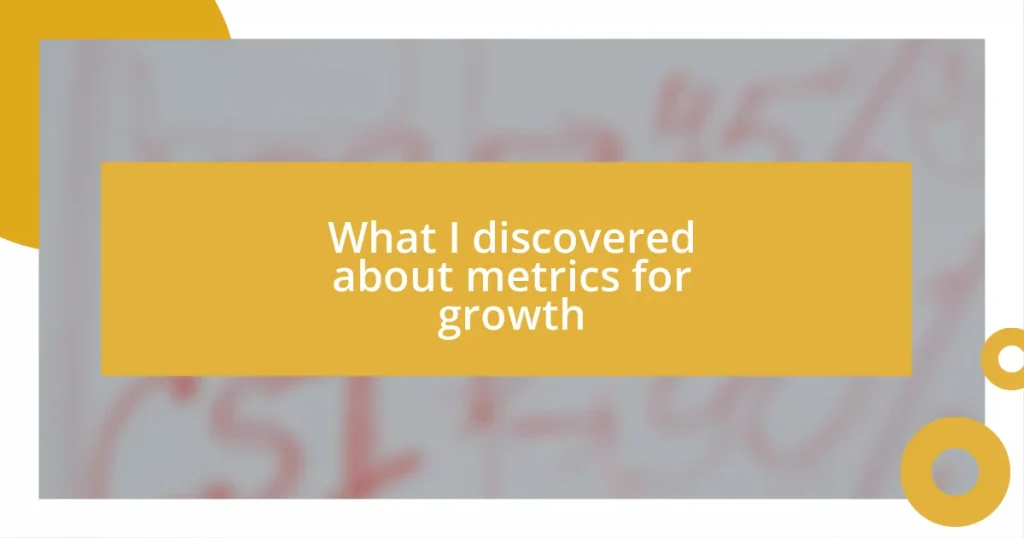Key takeaways:
- Mentorship requires active listening and emotional support, fostering resilience and confidence beyond just skill enhancement.
- Establishing trust and open communication is essential in building effective mentor-mentee relationships, with clear expectations and appreciation playing key roles.
- Setting specific, measurable, and achievable goals, along with reflecting on feedback, is crucial for personal growth and making mentorship actionable and rewarding.

Understanding mentorship impact
Mentorship has profoundly shaped my understanding of effective planning. I remember a conversation with my mentor, who emphasized the importance of listening over speaking. At that moment, I realized that absorbing knowledge from others can illuminate paths I hadn’t considered before—how often do we miss opportunities because we’re too busy talking?
There’s something incredibly rewarding about witnessing firsthand the impact of a mentor’s guidance. One of my most pivotal moments was when my mentor challenged me to stretch my comfort zone during a project. I was terrified at first, but stepping out of my usual approach opened new avenues I never thought possible. It made me wonder: how many times do we restrict ourselves by sticking to what feels safe?
Reflecting on my mentorship experiences, it becomes clear that the emotional support provided is just as crucial as the practical skills learned. I recall feeling overwhelmed when facing a tight deadline, and my mentor not only provided strategic advice but also offered a listening ear. It taught me that mentorship isn’t just about enhancing skills—it’s also about nurturing resilience and confidence. How often do we underestimate the power of emotional insight in professional growth?

Building effective mentor relationships
Building effective mentor relationships is all about establishing trust and open communication. I recall a time when my mentor and I met regularly, ensuring we had a space to discuss both successes and challenges. Those conversations allowed me to be vulnerable, share my struggles, and receive honest feedback. That level of comfort made it easier to seek guidance when I needed it most.
Here are some key elements to foster a strong mentor-mentee connection:
- Be Authentic: Share your true self and experiences, which can help build trust.
- Set Clear Expectations: Discuss what you both hope to achieve from the mentorship, providing direction.
- Embrace Openness: Regularly check in with each other about progress and feelings.
- Actively Listen: Pay attention to your mentor’s experiences and insights; this demonstrates respect.
- Show Appreciation: A simple thank you can go a long way in reinforcing a positive relationship.
Creating an atmosphere like this is not just beneficial for learning; it has the power to create lasting connections that can shape your career. I’ve felt the depth of this trust in moments when I hesitated to voice my ideas, yet my mentor’s encouragement allowed me to express thoughts I once considered silly. It’s in these exchanges that I discovered my confidence and clarity. The growth I experienced wouldn’t have been possible without that supportive relationship.

Setting clear goals for mentorship
Setting clear goals for mentorship is essential to ensure that both the mentor and mentee are aligned in their expectations and aspirations. I remember when I first engaged with my mentor; we took the time to outline my objectives explicitly. This exercise not only helped me pinpoint what I wanted to achieve but also allowed my mentor to tailor their guidance to suit my needs. By having clear goals in place, we both knew we were on the same journey, making our meetings more focused and productive.
When I think back to my mentorship experience, one specific goal stands out. I aimed to enhance my project management skills, and together, my mentor and I mapped out a strategy to tackle this. We broke it down into smaller, achievable milestones, celebrating my progress along the way. This structure gave me a clear sense of direction and motivated me to push forward—even when things got tough. It became a rewarding journey where every small success built my confidence and sense of purpose.
Articulating specific, measurable, and achievable objectives can transform a mentorship experience. I recall feeling overwhelmed at times, afraid my goals were too ambitious, but my mentor reassured me with practical examples of what had worked in their own career. This clarity not only calmed my nerves but also provided a roadmap for navigating challenges. Being able to see my progress with tangible milestones allowed me to appreciate the growth that mentorship can truly facilitate.
| Goal Type | Description |
|---|---|
| Specific | Goals should clearly state what is to be achieved. |
| Measurable | Establish criteria to measure progress towards the goal. |
| Achievable | Ensure goals are realistic and attainable given the time and resources. |

Learning through feedback and reflection
Feedback and reflection have been pivotal in my own mentorship journey. I recall a moment after presenting my project plan where my mentor offered constructive criticism. Initially, I felt a sting of disappointment, but what I learned through that feedback was invaluable: it wasn’t just about what I could improve but also about how I could approach issues differently. That shift in perspective turned a moment of self-doubt into a growth opportunity.
Reflecting on that experience, I discovered that constructive feedback isn’t just about the advice given; it’s also about how I process it. I chose to take detailed notes during our discussions, allowing me to revisit their insights later. In my mind, I wondered, “How might I integrate this feedback into my future plans?” That question spurred me to adopt a more proactive mindset, constantly seeking to refine my ideas based on learned experiences.
Moreover, I found that reflection often leads to deeper realizations. After a particularly challenging meeting, I jotted down my thoughts in a journal. This simple practice became a mirror for my thinking, revealing patterns in my approach that needed adjustment. Therefore, I ask you: how often do you take time for self-reflection after receiving feedback? Taking a moment to absorb and assess these insights can truly enhance the learning experience, ensuring that every piece of feedback contributes to your ongoing development.

Developing actionable planning skills
One significant takeaway from my mentorship experience was the importance of not just having a plan, but ensuring it was actionable. There was a time I felt lost amidst a myriad of tasks. My mentor suggested we create a weekly action plan together. By breaking down my overarching goals into specific tasks for each week, I felt a sense of accomplishment building momentum as I checked off items. That daily clarity enabled me to focus on what truly mattered, making the larger goals feel less daunting.
I often think back to how illuminating it was when I learned to pair each task with a timeline. In one of our sessions, my mentor posed the question, “What do you think will happen if you don’t set deadlines?” The answer became apparent during the weeks that followed; without deadlines, tasks became fluid, stretching far beyond the intended time frames. By committing to realistic time frames, my productivity soared, and I learned how accountability could be a motivating force.
Setting up action points for each mentoring discussion was a game changer too. It made me realize that mentorship isn’t just about receiving advice; it’s about applying that advice in real life. I remember my mentor encouraging me to practice what we had discussed after each meeting. Remembering to implement these strategies transformed our meetings from mere conversations into stepping stones toward tangible growth. So, when it comes to planning, I often reflect: how can I make my goals actionable today?

Overcoming challenges in mentorship
Navigating the challenges of mentorship often comes down to embracing transparency and vulnerability. I recall a time when I hesitated to share my struggles with my mentor, fearing it would reflect poorly on my ability. But opening up about the obstacles I faced turned out to be a crucial turning point. It not only strengthened our relationship but also led to more focused guidance. I started to wonder, how can sharing my challenges illuminate the path forward?
Another hurdle I encountered was the difference in our working styles. My mentor had a structured approach, while I thrived on spontaneity. At first, this disparity felt like a disconnect, but I learned to appreciate the balance we could create by blending our styles. I remember one session where we set aside time to discuss our preferences openly. Those conversations were eye-opening, helping me see how adaptability can enhance collaboration—showing me that mentorship is most effective when both parties are willing to meet halfway.
Lastly, I witnessed firsthand that not every session would yield immediate insights. There were times I left feeling confused or even frustrated. I learned to frame those moments differently, asking myself, “What can I extract from this uncertainty?” Focusing on the questions rather than the answers led to unexpected discoveries. I often found that the most profound learning emerged in these less-than-clear moments, reminding me that growth isn’t always a straight path. How often do we acknowledge the value of ambiguity in our own journeys?

Measuring success and growth
Measuring success and growth in mentorship involves more than just tracking completed tasks; it’s about recognizing the shifts in mindset and confidence that truly matter. I remember a pivotal moment when I received feedback from my mentor on a project I thought was spot-on. To my surprise, she pointed out not just the areas for improvement, but how far I had come in my thinking and approach since we began working together. That realization was incredibly affirming and made me question: how often do we take a step back to appreciate our own growth?
Success isn’t always quantitative; sometimes the qualitative changes are what really signal growth. I’ve noticed how my ability to articulate my ideas has improved over time. There were instances where I struggled to express my thoughts clearly, often leaving discussions feeling frustrated. Now, reflecting on those experiences with my mentor, I see the gradual progress. This transformation has made me ponder, aren’t the little victories just as vital as the big milestones in our journey?
In evaluating growth, I learned to use reflection as a powerful tool. After each mentoring session, I’d jot down my thoughts on what went well and what I could improve. One day, I rediscovered an old journal entry filled with doubts and uncertainties. As I read it, I couldn’t help but smile, recognizing how far I had come. This exercise not only instilled a sense of gratitude but also reinforced the idea that sometimes we need to look back to truly appreciate how much we’ve achieved. It has me wondering: how many of us take the time to reflect on our progress and celebrate our personal victories?















